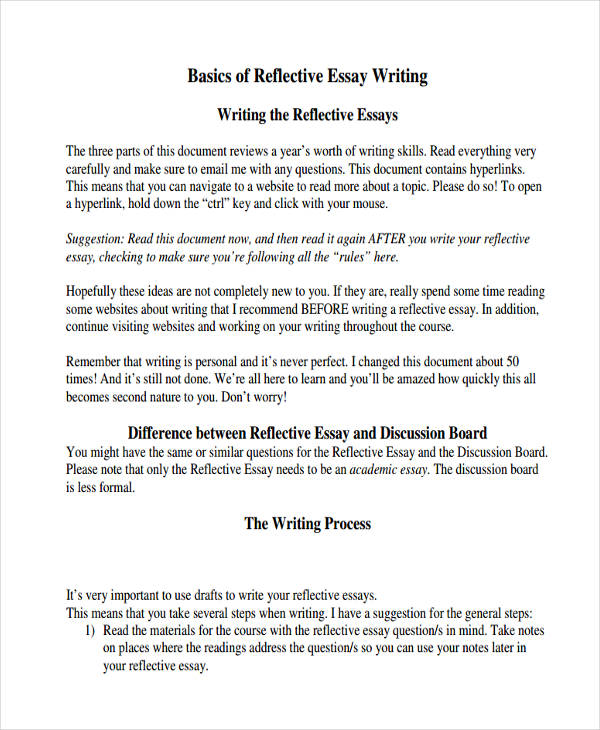
2 A short guide to reflective writing What is reflection, and why is it important? Reflection is a purposeful activity in which you analyse experiences, or your own practice/skills/responses, in order to learn and improve. Reflection in academia We reflect quite naturally in our day to day lives, thinking about things that have happened, whyFile Size: KB · In a reflective essay, a writer primarily examines his or her life experiences, hence the term ‘reflective’. The purpose of writing a reflective essay is to provide a platform for the author to not only recount a particular life experience, but to also explore how he or she has changed or learned from those experiences. Reflective writing can be presented in various formats, but you’ll most often see Reflective writing structure. Non-academic reflective writing is usually unstructured – such as writing in a personal diary, learning journal, or narrative for design development. You should structure your reflective assignments. There are lots of ways to structure your reflective writing,
Reflective Writing | Help & Advice | University of Portsmouth
A great deal of your time at university will be spent thinking; thinking about what people have said, what you have read, what you yourself are thinking and how your thinking has changed. It is generally believed that the thinking process involves two aspects: reflective thinking and critical thinking.
They are not separate processes; rather, they are closely connected Brookfield Figure 1: The Thinking Process adapted from Mezirowreflective piece of writing, SchonBrookfield There is neither a right nor a wrong way of reflective thinking, there are just questions to explore. Figure 1 shows that the reflective thinking process starts with you.
Before you can begin to assess the words and ideas of others, you need to pause and identify and examine your own thoughts, reflective piece of writing. Doing this involves revisiting your prior experience and knowledge of the topic you are exploring. It also involves considering how and why you think the way you do. The examination of your beliefs, reflective piece of writing, values, attitudes and assumptions forms the foundation of your understanding.
Reflective thinking demands that you recognise that you bring valuable reflective piece of writing to every experience. It helps you therefore to recognise and clarify the important connections between what you already know and what you are learning. It is a way of helping you to become an active, aware and critical learner.
Skip to main content, reflective piece of writing. myUNSW Moodle Library Handbook Email. Current Students. Sign on Search Menu. Student Home Getting Started Accept your offer How to enrol Student ID card Set up your IT Orientation Week.
Exams Results. The Nucleus: Student Hub. Psychology Health Service. Accommodation Health services Sport and gym. Moodle myUNSW Email Microsoft Office myLibrary Careers portal Change your password Need help? Student Support Academic Skills Writing skills Essay and assignment writing.
Figure 1: The Thinking Process adapted from MezirowSchonBrookfield Reflective thinking Reflection is: a form of personal response to experiences, situations, events or new information. a 'processing' phase where thinking and learning take place. What is reflective writing? Reflective writing is: documenting your response to experiences, opinions, events or new information communicating your response to thoughts and feelings a way of exploring your learning an opportunity to gain self-knowledge a way to achieve clarity and better understanding of what you are learning a chance to develop and reinforce writing skills a way of making meaning out of what you study Reflective writing is not: just conveying information, instruction or argument pure description, though there may be descriptive elements straightforward decision or judgement, e, reflective piece of writing.
about whether something reflective piece of writing right or wrong, reflective piece of writing or bad simple problem-solving a summary of course notes a standard university essay. See next: How do I write reflectively? Writing, critical thinking, exams and more. Personalised support and advice for you. Academic Skills Referencing. Essay and assignment writing. Essay and assignment planning. Answering assignment questions.
How do I write reflectively? Examples of reflective writing. Engineering and science. Other links and resources. Reading and note-taking. Contacts and appointments. Back to top.
Website Feedback Contacts Sitemap A-Z Guide Student Home. UNSW Sydney NSW Australia Authorised by Deputy Vice-Chancellor Academic UNSW CRICOS Provider Code: G TEQSA Provider ID: PRV ABN: 57 Page last updated: Monday 23 December
How to write a reflection for an assignment - Nursing UK
, time: 16:52FREE 19+ Reflective Essay Examples & Samples in PDF | Examples

Reflective writing structure. Non-academic reflective writing is usually unstructured – such as writing in a personal diary, learning journal, or narrative for design development. You should structure your reflective assignments. There are lots of ways to structure your reflective writing, Reflective writing is: documenting your response to experiences, opinions, events or new information. communicating your response to thoughts and feelings. a way of exploring your learning. an opportunity to gain self-knowledge. a way to achieve clarity and better understanding of what you are learning. a chance to develop and reinforce writing · As is the case with most reflective writing, a Personal Reflection is a response to a particular stimulus. Often, it is written by an individual to explore personal experiences, feelings and events. A personal reflection is an opportunity to reconsider events, thoughts and feelings from a fresh perspective. Many blog posts are written in this style
No comments:
Post a Comment